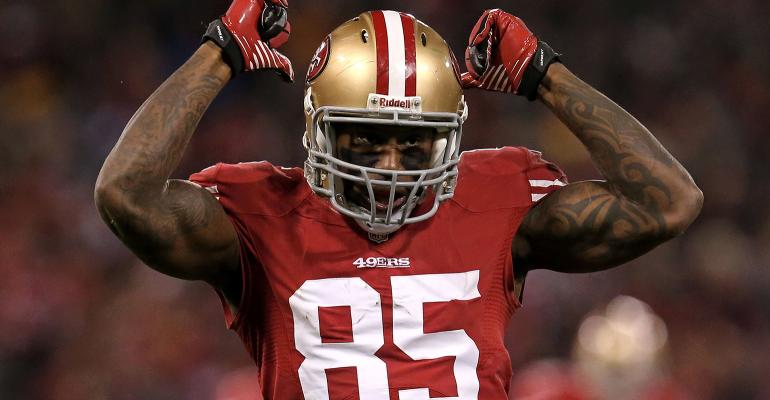(Bloomberg) -- Want to bet on star athletes like you bet on stocks? A number of wealthy investors just got their chance.
Fantex Inc., which offers tracking stocks on athletes including Washington Redskins tight end Vernon Davis and Atlanta Falcons wide receiver Mohamed Sanu, raised about $60 million in a private placement, according to a person familiar with the matter. UBS Group AG led the deal, said the person, who asked not to be identified because the information is private.
In exchange, investors received shares from Fantex based on the on- and off-field future earnings of a number of athletes. The company currently has agreements with 20 athletes, the person said: 10 from the National Football League, six from Major League Baseball and four from the Professional Golf Association. The majority of the stockholders are high-net-worth individuals, the person said.
Fantex, based in San Francisco, buys the rights to a player’s future earnings in exchange for proceeds from selling shares linked to an athlete’s brand and performance. The first offering was on behalf of Davis in November 2013, when he played for the San Francisco 49ers. Fantex sold a tracking stock linked to the tight end for $10 apiece, and paid him for 10 percent of future earnings.
Representatives from Fantex didn’t immediately respond to requests for comment. A UBS spokeswoman declined to comment.
The company’s first athlete agreement was with running back Arian Foster in 2013. At the time, Foster played for the Houston Texans and pledged 20 percent of his on- and off-field earnings to the company in exchange for the most of the proceeds from the planned $10.6 million sale of his tracking stock. That offering was postponed in 2013 when Foster underwent season-ending back surgery.
Fantex had intended to go public itself. The registered trading platform filed in November 2015, seeking to raise as much as $29.5 million issuing a single security that bundled its tracking stocks. It didn’t proceed with that IPO, instead opting for the private placement, the person said.
The idea of cashing in on athletes outside the betting world or fantasy sports leagues is a new one. The company has had to convince investors to buy into the cash flows from athletes’ playing contracts and endorsement deals.
Fantex tries to ink agreements with newer athletes: Rookies, or players starting out with the promise of successful careers. The slice of earnings that the company takes is expected to lead to a mid- to high-teen yield, Fantex has told investors, according to the person familiar with the situation.
Orders for the tracking stocks are posted and executed by Fantex brokerage’s alternative trading system.
To contact the reporter on this story: Alex Barinka in New York at abarinka2@bloomberg.net To contact the editors responsible for this story: Elizabeth Fournier at efournier5@bloomberg.net Elizabeth Wollman





